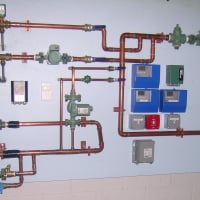Heating at The Henry Ford
Now the reason for my post. They had some really awesome radiators there. some wall hung and some that wrapped around the vertical support columns in the building. It's a hot water system. Enjoy the pictures!





Comments
-
-
They look like regular T's, I assume gravity would have moved water through the radiator out of the horizontal pipe below it. Looks cool! You weren't lying when you said radiation wrapped around the columns....Serving Northern Maine HVAC & Controls. I burn wood, it smells good!0
-
Henry Ford didn't cheap out on anything. The building itself is absolutely incredible all by itself, the exhibits only add to it.
For any wood working fans, the entire floor is made up of ~1.4 million pieces of Teak, yes Teak wood. The tour guide said the floor is quite possibly the most valuable part of the building, I wouldn't argue that point much.1 -
-
> @DanHolohan said:
> I nearly lost my mind on my first visit to that place.
I told my wife we are going back, don’t know when, but it will be happening. She is in complete agreement with me, so that means we have to go.0 -
-
-
I've visited The Henry Ford several times over the years.
Keep in mind that their exhibits change over time. If you've seen something there in the past and want to see it again, you may be disappointed.
On the other hand, the new exhibit may may be even more wonderful than the exhibit it replaced.
Always worth a visit if you're in the Detroit metro area and you have the time.Dennis Pataki. Former Service Manager and Heating Pump Product Manager for Nash Engineering Company. Phone: 1-888 853 9963
Website: www.nashjenningspumps.com
The first step in solving any problem is TO IDENTIFY THE PROBLEM.0 -
I wonder if the lower tee is a Monoflo.--- I once was at a high school in Erie, Pa.and the steam header was 12" threaded pipe as were all fittings and valves. What a work of art!0
-
That's a great museum.
President
HeatingHelp.com0 -
Well except for his employees' wages LOLKC_Jones said:Henry Ford didn't cheap out on anything.
NJ Steam Homeowner.
Free NJ and remote steam advice: https://heatinghelp.com/find-a-contractor/detail/new-jersey-steam-help/
See my sight glass boiler videos: https://bit.ly/3sZW1el1 -
-
I read a book about Fordlandia years ago.Retired and loving it.0
-
-
My pleasure! Thanks.Retired and loving it.0
-
Wasn't Henry Ford actually famous for paying his workers above market wages?
http://www.econport.org/content/handbook/Unemployment/Efficiency/Henry.html1 -
Awesome Great pics!I am the walking Deadman
Hydronics Designer
Hydronics is the most comfortable and energy efficient HVAC system.0 -
> @heritageproperties said:
> Wasn't Henry Ford actually famous for paying his workers above market wages?
>
> http://www.econport.org/content/handbook/Unemployment/Efficiency/Henry.html
Yes, because he wanted his employees to buy his cars. It wasn't his wages that people criticized. It was how hard he worked them and the conditions.0 -
So the wages weren't high enough to compensate for the working conditions...they were too low
NJ Steam Homeowner.
Free NJ and remote steam advice: https://heatinghelp.com/find-a-contractor/detail/new-jersey-steam-help/
See my sight glass boiler videos: https://bit.ly/3sZW1el0 -
No they weren't.0
-
That's an oversimplification. It cost him money to pay his employees more. He wasn't even coming close to recouping those wages by selling his employees cars. Here are the numbers. He raised it from $2.34 to $5.00 per day. That is $691.00 per year wage increase. At that time a Model T cost $440.00 and eventually went as low as under 300, all the while he was increasing wages. He "lost" money no matter how you look at it. The reality was he wanted his employees to have a better quality of life overall, not just buy his cars. Don't forget when he increased wages he reduced work hours as well, from 9 to 8.JakeCK said:> @heritageproperties said:
> Wasn't Henry Ford actually famous for paying his workers above market wages?
>
> http://www.econport.org/content/handbook/Unemployment/Efficiency/Henry.html
Yes, because he wanted his employees to buy his cars. It wasn't his wages that people criticized. It was how hard he worked them and the conditions.
He did have some self serving motivation. Turnover. He had issues retaining employees because assembly line work is mind numbing and many couldn't handle it. He figured with higher wages he could get the best employees available and lower turnover rate, and it worked.
The work hour reduction was to allow more leisure time for the employees so they had time to enjoy the consumer goods he and other industrialists were producing. So the people get more time to themselves and the company sells more goods.
Henry Ford wasn't the best person by any stretch, but when looking back on what he did, there was a whole lot of good that he did for his employees given the climate at that time. I don't have an issue if people don't like him, but at least report the history accurately.4 -
KC you're exactly right on all accounts. I just didn't feel like going into detail. I have no qualms with the guy or family. And in fact there is currently 4 fords sitting in my driveway. Three of them black.

And to be clear I wasn't criticizing his methods either. Not only is assembly line work mind numbing it is also fast paced. My grandfather retired back in the 80's at the foundry and both my father and uncle worked there for a short time. Honesty I wish it was still the gravy train it used to be. I'd pack my s$&# up where I'm at now and walk out of there for a chance to make what they did back in the 60s through the 80's.1 -
@JakeCK understood, the short answers presented like you had issues. Honestly he had some traits that were quite undesirable, including towards his own son at times.1
-
I've heard he put Edsel in an early grave.KC_Jones said:@JakeCK understood, the short answers presented like you had issues. Honestly he had some traits that were quite undesirable, including towards his own son at times.
Single pipe 392sqft system with an EG-40 rated for 325sqft and it's silent and balanced at all times.
0 -
I remember going there as a kid and looking at the columns and realizing they were radiators. Does anyone know who made them? I'd imagine they were custom to curve like that.0
-
So I was curious enough about this to send a message asking what these radiators were. They sent me cut sheets, some of the drawings, and the various bid and RFI documents. They were made by a company called Shaw-Perkins in Pittsburgh. It was an archivist at the Benson Ford Research Center that found the documents for me. @Erin Holohan Haskell you might want to add these to the library.
8 -
So the answer is that it is forced hot water and the wall hung radiators are out of a catalog but the radiators around the columns are custom made with curved headers from the same manufacturer. There are specs for the boiler and the system in one of the documents too, it specifies some pumps and motors(but doesn't specify the pump manufacturer as far as I have read so far).
0 -
That's awesome that they send you all that. The museum just got cooler.
2 -
Over 20 years ago when I was doing building automation I got to see behind the scenes there and was equally impressive. Was fortunate enough to get to work in some pretty historic buildings in Metro Detroit. Ford and GM spared no expenses in their buildings back in the day. The Detroit Institute of Arts was a really cool building still operating air handlers with DC drive motors and leather drive belts feeding copper ductwork in parts of the buildings until the early 2000s. There were several mechanical rooms downtown that had polished terrazzo floors, marble faced control panels for old DC motors and pneumatic equipment. With district steam plants everything was steam air handling coils, heat exchangers and steam absorber chillers. There has been a big push the past 20 years to get off of district steam. Several buildings have switched to hot water boilers or installed their own steam boilers. My dad used to drag me around as a kid on a few pneumatic service calls on the weekends and was lucky to see some of the old buildings.
Owner of Grunaire Climate Solutions. Check us out under the locate a contractor section. Located in Detroit area.
2 -
-
I like the Y fittings on the rads with unions. Don't think I have ever seen those before. When was that building built I would guess 20s?, 30s?
0 -
The bid documents are dated various times in 1929, the complex was dedicated in October 1929:
0 -
0
Categories
- All Categories
- 87.5K THE MAIN WALL
- 3.3K A-C, Heat Pumps & Refrigeration
- 61 Biomass
- 430 Carbon Monoxide Awareness
- 122 Chimneys & Flues
- 2.1K Domestic Hot Water
- 5.9K Gas Heating
- 116 Geothermal
- 169 Indoor-Air Quality
- 3.8K Oil Heating
- 78 Pipe Deterioration
- 1K Plumbing
- 6.6K Radiant Heating
- 395 Solar
- 15.9K Strictly Steam
- 3.5K Thermostats and Controls
- 57 Water Quality
- 51 Industry Classes
- 51 Job Opportunities
- 18 Recall Announcements


















